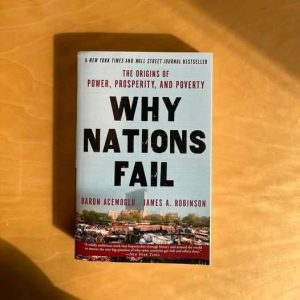“Inclusive economic institutions also pave the way for two other engines of prosperity: technology and education.”

In Why Nations Fail: The Origins of Power, Prosperity, and Poverty, economists Daron Acemoglu and James A. Robinson explore the underlying reasons why some nations achieve prosperity while others remain trapped in poverty. They argue that political and economic institutions play a crucial role in determining a country’s success or failure. Here are 10 essential lessons from this insightful book:
1. Inclusive Institutions Foster Prosperity
Nations thrive when they have inclusive institutions that encourage participation, innovation, and economic growth. These institutions allow individuals to freely pursue economic opportunities, fostering broad-based prosperity.
2. Extractive Institutions Lead to Poverty
Extractive institutions, which concentrate power and wealth among a small elite, suppress individual and economic freedoms. Such institutions hinder growth and innovation, often keeping nations impoverished.
3. Political Power Drives Economic Success
Political inclusivity—where power is distributed broadly rather than held by a few—allows for the development of economic institutions that support innovation and fair opportunities. This political foundation is essential for sustained economic success.
4. The Role of Creative Destruction
Innovation often disrupts existing power structures and industries, a process known as “creative destruction.” Prosperous societies embrace this process, while extractive ones resist it to protect the elite’s interests, limiting progress.
5. Colonial Legacy Matters
The authors argue that the legacy of colonialism heavily influenced modern institutions. Regions where colonizers established extractive institutions often remain impoverished, while those with inclusive institutions inherited from colonizers fare better.
6. Geography Isn’t Destiny
While geography influences a nation’s development, it isn’t the determining factor in prosperity. Nations with similar geographies can have vastly different outcomes based on their political and economic institutions.
7. Small Changes Can Lead to Big Shifts
History shows that small institutional changes, such as shifts in power or policies, can have far-reaching impacts on a nation’s trajectory. These “critical junctures” can create paths toward inclusivity or deepen extractive systems.
8. Political Stability and Rule of Law are Key
Political instability and lack of rule of law prevent long-term investments and innovation. Nations with strong, stable institutions encourage entrepreneurship and economic growth, leading to lasting development.
9. Corruption and Lack of Accountability Undermine Growth
When elites exploit resources and exercise power without accountability, it leads to corruption, inefficiency, and poverty. Transparent governance is crucial for creating a fair and prosperous society.
10. Nations Fail When Leaders Prioritize Power over Progress
Nations often fail when leaders prioritize maintaining power over creating progress for the majority. True development occurs when those in power create institutions that benefit everyone, not just themselves.
Why Nations Fail offers a powerful argument for the importance of institutions in shaping a nation’s fate. Acemoglu and Robinson’s analysis emphasizes that inclusive, transparent governance and economic opportunity are foundational to achieving prosperity and avoiding the trap of poverty.
Peoplesmind
